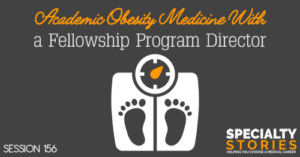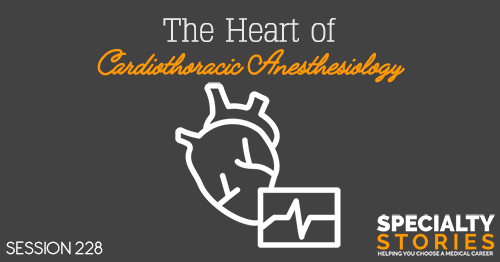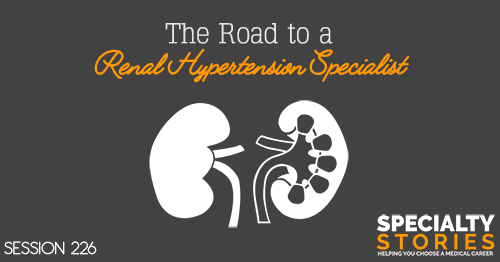Apple Podcasts | Google Podcasts
Session 156
Dr. Jessica Barfield is the Fellowship Program Director in Obesity Medicine at Wake Forest Baptist Health. Dr. Barfield is going to talk about her journey to obesity medicine, what she likes about it, what she doesn’t like about it, and more!
If you want to learn more about Obesity Medicine, go to obesitymedicine.org or the American Board of Obesity Medicine.
For more podcast resources to help you along your journey to medical school and beyond, check out Meded Media.
Listen to this podcast episode with the player above, or keep reading for the highlights and takeaway points.
[01:48] Interest in Obesity Medicine
Jessica’s interest started during medical school when she met a professor who was in the GI department. She was internal medicine-trained only so she never did a fellowship in GI. And she worked with one of the GI physicians to run what is now considered an obesity medicine practice. At that time, the field was still very much in its infancy and wasn’t an established subspecialty. But she had a very strong passion for this area.
She emphasized how much impact patients could have on their health with behaviors. not even really necessarily significant amounts of weight loss, but just losing that five, five to seven to 10% could really improve their health and that they had the power to do that, if we could help them, change those behaviors. So she was the first influence in Jessica’s life.
“Many of the internal medicine bread-and-butter diseases have a common potential cause and an aggravating factor of excess weight.”Click To TweetThen when Jessica was in her internal medicine residency, she was lucky enough to be paired with a primary care practice professor who did research in obesity. It was mainly around inequalities in health care and access of patients with obesity.
Jessica asked around and looked into some different programs and rotated through some electives until she was able to secure that path. It’s very contagious, especially when you meet someone who has such an interest and a passion for what they’re doing. And that’s the goal is to really enjoy what you do.
[06:10] The Biggest Myths or Misconceptions Around Obesity Medicine
For Jessica, the greatest myth is the idea of futility in terms of treatments. Are they sustainable?
“There's a lot of bias against obesity medications, devices, surgeries, even though we've had tremendous growth and development in this field over the past 10-15 years.”Click To TweetCurrently, there are five medications that have now been FDA-approved. We’re also getting much better with the surgical techniques and the outcomes. Long-term weight loss and maintenance is where we’re turning more attention to.
Another misconception is that it’s inevitable people will regain the weight, or that the medications don’t really work or that they’re unsafe. Or that they have more harm than benefit.
The rates of delivery of obesity treatment compared to something like diabetes are still significantly lapsing and far behind. Around 2% to 3% of patients who qualify for obesity medication are being prescribed that therapy whereas 85% of patients with diabetes are getting appropriate therapy.
Additionally, there are still experts in the field who argue that obesity is not a disease. It took until 2013 for the American Medical Association to designate it as well as Medicare and payers to recognize it as a disease.
[09:26] Understanding Its Complexity
It is important for students who want to go into an area where patients with obesity are going to be common in their practice that they understand its complexity. Diet and exercise are the main modifiable factors but we’re probably just seeing a fraction of the causes.
There are patients who face significant challenges maintaining their weight and the complexities that go into weight loss and sustaining that. That being said, the genetic link to obesity has been very well established. And so, people who have one parent with obesity are already looking at probably a 50% higher risk of obesity themselves. If both parents have obesity, then their risk goes up to 85% to 90%.
“People who have one parent with obesity are already looking at probably a 50% higher risk of obesity themselves.”Click To TweetThey have identified genes that are linked to a higher propensity towards obesity, as well as factors that affect weight such as sleep, the environment, etc.
Certain comorbidities and other medical problems and other psychological issues can impact weight.
Hormonal changes also come into play. Some people have different levels of hormones that regulate appetite, regulate weight, as well as the neurons and the neural circuitry in the brain.
Control of all of this is very complex and highly variable. Some people have that very strong sense of reward or hedonistic response, which may lead them to be more vulnerable to overeating.
There are so many different factors that lead to obesity, which makes it a fascinating field. So Jessica encourages students who might be interested in the field to really look into the possible causes because it’s not just a matter of willpower or eating less and moving more.
[12:58] Traits That Make a Good Obesity Medicine Specialist
You have to have that desire because this is still a new field. Patients that are clinicians in this field tend to be pretty highly self-motivated. The path is getting easier in terms of knowing how to get into this field. The fellowships are established and they’re now close to 20 programs, which is awesome. So that’s much easier to obtain.
You’ve got to have that self-motivation so you could get that exposure earlier. For example, at Wake Forest, they offer a fourth year medical student three-week elective where they can come in and spend time with them doing obesity medicine. So try to seek out those kinds of experiences.
Patients like the idea of counseling and motivational interviewing and helping patients identify what are their goals, what’s motivating them, and what do they want to change.
“It's a very different type of medicine that you practice. You're not necessarily just writing a prescription. You're not just doing a procedure.”Click To TweetObesity medicine is a great specialty for people who like long-term relationships with their patients. You’re usually seeing your patients on a monthly basis. And when they lose the weight, you’re maintaining that follow up care. At least every three to four months, you’re checking in and making sure that the weight stays managed.
Obesity medicine is for students that really like the idea of transformative medicine. It’s the idea that you’re trying to change someone’s life in order to improve their health. You go after the root cause rather than just treating one specific disease.
[16:03] Types of Patients
Some clinicals say they enjoy primary care and they want to incorporate obesity medicine into their practice. Or some endocrinologists or OB/GYN decide they want to do both. But for people who truly want to do obesity medicine, like Jessica, they are only doing obesity medicine.
And she makes it very clear to her patients that she does not replace their primary care doctor and she doesn’t take over their care.
Now, there are some blurred lines with that because of the crossover of typically these patients coming in with other comorbidities that tend to change when they lose weight.
So she has to make those patients understand that as they progress with their obesity treatments, certain things could also change. Whether that’s their blood pressure or their dietary cholesterol could change.
The key is to make sure you’re in good communication with your primary care doctor or provider. Jessica doesn’t want patients and primary care providers thinking that she’s going to manage the primary care of the patient as they’re doing obesity treatment.
[18:03] Bariatric Centers and Other Related Opportunities
Most bariatric centers will have an obesity medicine specialist in some capacity. So most of them try to have an MD that is board-certified or fellowship-trained. And some will have nurse practitioners who manage the medical piece of it.
Some good evidence now shows that the preoperative management of patients prior to surgery, in conjunction with the post-operative management, provides the best outcomes.
More and more are now doing combination therapy. Patients will have bariatric surgery. But they may still utilize obesity medications with them at some point. This helps improve their success or if there’s any relapse and weight regain, then they can utilize the medical aspects as well.
One of Jessica’s areas of interest particularly is the nutritional deficiencies. She also encourages students who may be interested in this field to also look into this area. There’s great opportunity to understand vitamin mineral deficiencies as well as issues with osteoporosis and some of these other long-term complications that may come with bariatric surgery.
[19:52] Are There Procedures in Obesity Medicine?
Procedures in Obesity Medicine are now becoming more and more common as well. There are now certain obesity medicine fellowships that have curriculum opportunities for devices.
For example, for someone who didn’t want to do surgery but like the idea of procedures, there are now more devices being developed with endoscopy, and different things that don’t require surgery.
So if you’re interested in that more than the medical side, you could do some extra training to be able to do some procedures.
“There are some opportunities if you don't want to go the surgical route, where you could still have procedures incorporated into your practice.”Click To Tweet[21:02] Taking Calls and Life Outside of the Hospital
Work-life balance is one of the things that draw people into this field. Jessica is never on call, or rather she’s always on call that she doesn’t take calls, if that makes sense.
For example, if a patient has a medication reaction or something like that, then obviously they would probably call the hospital and would ask to have her contacted. But this has only happened maybe twice in about seven years. Jessica is more into clinic-based care and not requiring calls so she gets to enjoy her nights and weekends.
“Obesity medicine is a non-emergent type of care.”Click To TweetThat being said, Jessica is able to get a life outside of the hospital. This field gives you plenty of opportunities to be a leader or to be in clinical practice, in education, in research, or in policymaking.
There are so many different areas that you can do with this training and this type of background and you can fill your plate as much as you want.
You can go into academics or you could go into a community practice. There are also obesity medicine specialists who enjoy orthopedic practices because of that requirement to be at a certain below body mass index in order to have your joint in place. So they may work specifically on helping those patients with weight loss to get ready for surgery and to maintain it after their joint replacement.
Ultimately, you’re able to tailor what type of career and what level of demand and intensity you want. There’s a wide range of opportunities that students could choose from.
[24:46] The Training Path
The typical training is a residency in either internal medicine or family medicine. Jessica exceeded those trying to do the board certification in those. Then you would want to sit for the American Board of Obesity Medicine.
As of now, there are two different pathways for that. There’s a CME-based (Continuing Medical Education) pathway where you have to accrue a certain number of CME hours and prove and validate those. Then you can go ahead and register and sit for the exam.
The second is a fellowship-trained pathway, which Jessica strongly recommends based on her own experience and the experiences of her colleagues in this field. She believes this pathway gives you a much richer, much deeper breadth of education and training.
You get that actual hands-on ability to appreciate the complexities. You also get to go to a higher level of treatment, more complex patients, and more advanced practices with the use of medications and devices. There are more opportunities for managing joint care of those patients as well as more education and more research opportunities.
There’s the Obesity Medicine Fellowship Council where you can look into the different programs that are out there. Look into the American Board of Obesity Medicine and see the curriculum that it covers.
Reach out to anyone at your institution that has any connection to obesity medicine.
“Most experts in the field get extremely excited when they're contacted by someone that has an interest and wants to learn the path.”Click To TweetJessica strongly recommends doing an obesity medicine fellowship, which is usually just an extra year, on average, after residency.
As the program director for the fellowship program at Wake Forest, specifically on their third year of fellowship, she adds that institutions offering training are all trying to have a standardized curriculum. That way, they can be confident that they’re training the fellows similarly, having that high standard of care and level of expertise,
[28:12] What Makes a Competitive Applicant for Fellowship
As the program director at their institution, Jessica says they look for someone with a strong interest in this field. They need to have a true appreciation of obesity as a disease and that this is a specific field in and of itself.
Jessica advises gaining any experience as much as you can, whether it be research, an elective, a visiting elective, or maybe doing extra time in a field connected to obesity. It could be something like diabetes or Nonalcoholic steatohepatitis (NASH) clinic or fatty liver disease.
Jessica cannot emphasize more the importance of reaching out to someone in the field because that speaks volumes, rather than just applying and checking the boxes.
[30:04] Message to Future Primary Care Physicians
Jessica wants future primary care physicians to know that this field exists and that there are really good treatments. There are specialists out there.
There are studies that show that when primary care providers discuss and counsel patients about their weight, their patients lose more weight. So you can absolutely plant the seed even if you don’t feel comfortable recommending surgery.
Refer as early as you can. And if you don’t have one in your institution, find where the nearest one is and at least have that referral basis.
Jessica explains how it’s very different when you have to initiate that conversation. The earlier primary care physicians could refer their patients, the better they’re able to start that conversation. And usually, one of the best tactics is just asking permission.
If you don’t know what else to say, one of the best things to say is to ask whether it’s okay to talk about their weight or if they have concerns about their weight or how their weight affects their health.
“Just have that one-liner that you could use over and over again to initiate the conversation around weight.”Click To TweetAgain, just know that the referral is out there and that the field exists. There are excellent valid treatments and they would be happy to take over the care. They’re able to give that in-depth, intense treatment that’s needed, particularly for patients with severe obesity, which is challenging to do in the primary care setting.
[35:09] What He Wished He Knew That She Knows Now
Jessica thinks she didn’t appreciate that there were that many career paths and that there are different ways you could really practice obesity medicine and be involved in the field.
So luckily, if that mentor hadn’t suggested obesity medicine, she wouldn’t have looked into it because she wouldn’t have thought of it as a standalone field. And so she probably would have gone into one of the more established subspecialties, or just tried to do it with primary care.
And Jessica just feels happy to be able to see the tremendous amount of ways to shape your career with Obesity Medicine being a dedicated field.
[36:27] The Most and Least Liked Things
What Jessica loves about Obesity Medicine is the long-term relationship with patients. She didn’t like the idea of just taking care of patients once. She also loves the ongoing research and development in this field since it’s still relatively new.
The success stories of patients are also inspiring. It’s rewarding to see this domino effect that happens when people make these changes. They start to lose weight, they start to sleep better, their mood improves, their health improves, and they can move easier.
They have those simple goals of walking up a flight of stairs without breathing heavy or having to stop, and those change their quality of life and their health.
“It’s hard work. It doesn't come without some costs and some changes and some blood, sweat, and tears. And it’s great to see and be a part of that!”Click To TweetWhat she likes the least on the flip side are the challenges of what we still don’t know. The variability to response and to treatments is still very high.
Jessica wishes they had a better ability to tailor interventions and predict what’s going to work for patients just by talking to them. Unfortunately, there’s still a lot of trial and error in terms of dietary changes, medications, and changes in physical activities. So she wants to make sure she’s choosing the best treatment for her patients.
Hopefully, with more research and more advancement, they’ll be able to get those answers much faster.
[39:23] Major Changes Coming into the Field of Obesity Medicine
With the standardized training and board certification, Jessica thinks they will soon become recognized as a standalone ACGME-accredited fellowship because they’re not as of now. The reimbursement and the buy-in from payers and other clinicians and providers are going to improve. Policies are going to improve, as well as the treatments themselves.
“There’s some really exciting work being done with different medications and different combinations of medications.”Click To TweetThere is also an advancement in food technology out there in terms of having the lowest calorie energy density and hunger-controlling foods. They actually have the technical ability to modify and develop those and that may come close.
[41:34] Final Words of Wisdom
If she had to do it all over again, Jessica would still have chosen the same field.
Finally, if you’ve got that interest, just just go with it. Dig deep and look into the field. Do some research. Talk to people as much as you can.
Connect with anyone, any mentor, a network, or someone to just ask your questions and get a little bit more information. Go for it because you’ll be surprised what this field entails. The complexity of this, the depth, and the opportunities are awesome. So if there’s even a hint of interest, check it out and just see what it could turn into.
Links:
The Academy of Nutrition and Dietetics
SEARCH SITE
LISTEN FOR FREE












